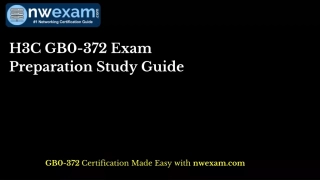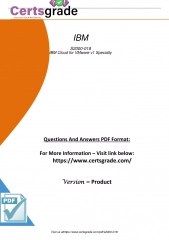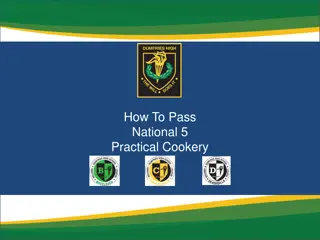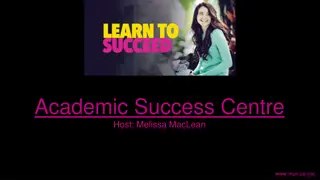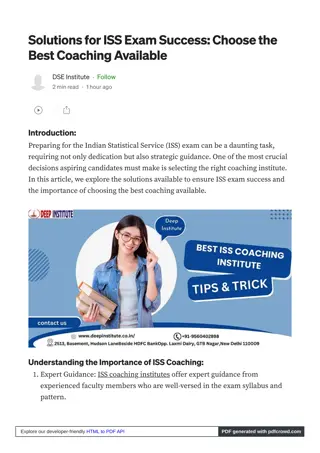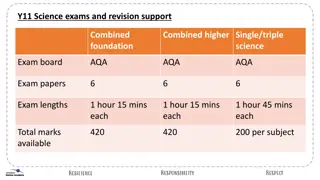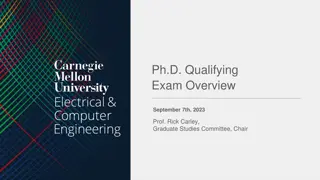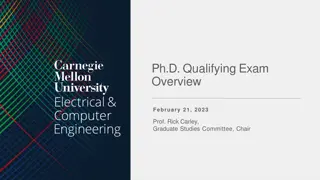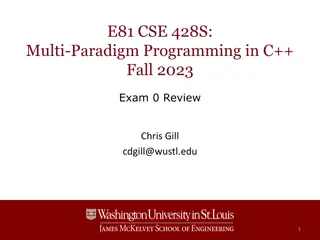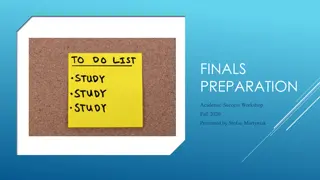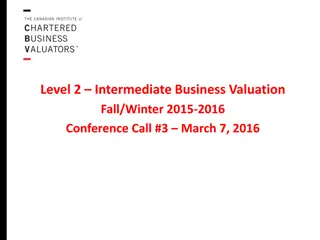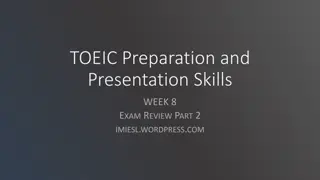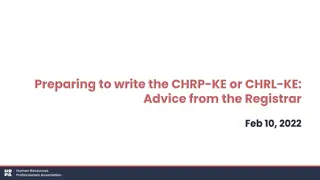Exam Preparation Strategies for Academic Success
Explore essential strategies for exam preparation, academic accommodations, assessing mentee readiness, recognizing signs for professional support, and making effective referrals. Gain insights on key ideas to enhance studying techniques and support student success. Learn about providing guidance as a Peer Mentor and ensuring mentees are equipped for exam success.
Download Presentation

Please find below an Image/Link to download the presentation.
The content on the website is provided AS IS for your information and personal use only. It may not be sold, licensed, or shared on other websites without obtaining consent from the author. Download presentation by click this link. If you encounter any issues during the download, it is possible that the publisher has removed the file from their server.
E N D
Presentation Transcript
EXAM PREPARATION Caleigh Minshall Learning Strategies Outreach Coordinator Queen s University
Overview Academic Accommodations Assess Preparedness Key Ideas Making an Exam Schedule Stages of Studying Taking Exams Resources
Academic Accommodations Disability Services Office Student responsible for informing institution about disability Student provides documentation Disability Advisors determines accommodations, assists with advocacy Protected by Ontario Human Rights Code Mental Health Crisis/Short-Term Disability Many mental health issues are episodic Students can request short-term accommodations by [INSERT INSTITUTION PROTOCOL]
Assess Mentees Preparedness Review Student Wellness Assessment with Mentee: Strengths? Weaker areas? Gather information about your Mentee s current academic situation Lecture attendance? Lecture notes? Reading completion? Reviewed and understood comments on marked midterms and assignments?
Time to Refer! Signs a Mentee needs professional advising/support: Student has not attended classes, completed readings Student has missed a significant number of assignments Evidence of academic failure; unlikely to pass course Student is in a state of panic/anxiety, or student is in state of avoidance/denial
Referrals: Peer Mentors Role Your role as a Peer Mentor: Express concern Directive role (more decisive or clear) Peer Mentor to consult with Program Coordinator, then refer student to a professional, depending on needs (academic advisor, professional learning strategies advisor, disability advisor)
Exam Preparation: Key Ideas Key ideas to teach mentee about studying: Match strategies to expected levels of thinking Learning studying Preview Take notes Review Write a short summary ( What was that all about?) Distribute your learning over time Self-testing is key: it s a reality check and it improves memory
Teaching Key Ideas (Activity) Be direct. Explain the concepts. Use examples from their courses. Go slowly. Check for understanding. Practice activity Watch Leveling up: How to think smart at university again as a group In pairs: 1 person plays Peer Mentor, other person plays Mentee Mentor introduces Levels of Thinking to mentee in 3 minutes.
Teaching Key Ideas: Debrief Mentee: Do you understand how the concept applies to your situation? What did you learn about thinking? How did you feel at the end of the role-play? Peer Mentor: Did you work collaboratively? Did you support the Mentee s worthiness, dignity? Did you address one idea at a time?
Why a Study Schedule? Helps to provide sense of control Reality check Is the student up-to-date? Does she understand the material? Helps to ensure regular relaxation time
Study Schedule Reflection (Activity) Break into small groups of four On your flipchart, answer the following questions as a group about your experience of creating the study plan: What worked? What didn t work? What is still confusing? 7 minutes. to discuss as a group. Then each group shares their results.
Considering Mental Health How can Mentors help Mentees create an exam schedule that acknowledges their unique needs and abilities? Reflect on past experiences and strategies that have worked Encourage Mentee to realistically assess their current abilities and needs Schedule in time off to relax + day(s) off to catch up if needed
Exam Study Schedule: Activity #1 Scenario: Stacey is taking a full course load this term. You are going to help her identify her goals, prioritize her workload, and create a study schedule while ensuring this is a collaborative effort. Step #1: Transfer Stacey s exams and other commitments into the exam study schedule. On a separate piece of paper, write down any questions you might ask Stacey as you progress through this part of the template.
Exam Study Schedule: Activity #2 Debrief: Questions/concerns from Step #1? Scenario: Stacey mentions that her hardest course will probably be DEVS 100. She missed weeks 4 and 5. Step #2: Examine the arts/social science/humanities type course syllabus. How might you chunk this course content? Once you are finished dividing the syllabus into chunks, add them (in pencil) to the schedule. As always, write down any questions you would ask Stacey as you progress through this part of the template.
Exam Study Schedule: Activity #3 Debrief: Questions/concerns from Step #2? Scenario: Stacey suggests her second-hardest course is the ___Math__ course. Step #3: Examine the problem-solving type course syllabus. How might you chunk this course content? Once you are finished dividing the syllabus into chunks, add them (in pencil) to the schedule. As always, write down any questions you would ask Stacey as you progress through this part of the template.
Exam Study Schedule: Debrief Debrief: Questions/concerns from Step #3? Reminder: This activity will move more quickly than a real session with your Mentee.
Troubleshooting Stacey makes the schedule, but can t stick to it? Stacey thinks everything is really important how does she choose? Stacey does not understand the material or has missed a lot of it? Other issues?
Process of Studying Match study strategy with the expected level of thinking Look for clues about exam content Exam Bank, midterm, learning objectives in course syllabus Studying as a process: Preview Take notes Review Write a short summary ( What was that all about?) Self-test
Stages of Studying: Preview and Review Preview and Review Skim lecture notes, Learning Objectives, syllabus What is this going to be about? Spend ~5 minutes reviewing what you studied the last time (if possible)
Stages of Studying: Note-taking and Summaries Take notes, Review, Summarize Create summary notes Cornell Cue cards Mind maps Essential: Write in your own words Drill: Repeat, recite
Stages of Studying: Self-testing and Group Study Strategies for self-testing: Exam Bank Companion websites Generate own questions Old quizzes Group Study (25%)
Exam Tips and Tricks Mentee FAQs Logistics: When to arrive? What to bring? What if I forget everything? Helpful reminders Get a full night s sleep before the exam Eat beforehand Make a plan Know how much time to spend per question How do you plan on rewarding yourself after an exam?
Reflection What have I learned from this session? How will I apply it?
Resources and Questions List relevant campus resources here as a reminder to Peer Mentors




